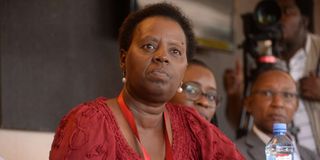EABL plans for 50:50 gender balance by 2025

Ms Jane Karuku.
What you need to know:
- Kenya Breweries Managing Director Jane Karuku says EABL is pursuing gender diversity from the top.,
- Currently, 37 per cent of the company’s board members and 38 per cent of the Group’s executives comprise of women, from an average of 20 per cent about a decade ago.
- The company has also rolled out an internship programme to get more female graduates from Stem degree programmes.
East African Breweries Limited has put strategies in place to achieve 50:50 gender balance by 2025.
Kenya Breweries Managing Director Jane Karuku, who also sits in the board of East African Breweries Limited (EABL), said the listed company is pursuing gender diversity from the top.
Currently, 37 per cent of the company’s board members and 38 per cent of the Group’s executives comprise of women, from an average of 20 per cent about a decade ago.
EABL recently appointed Ory Okolloh, a renowned leader in corporate and non-profit circles, as a non-executive director to the board.
Ms Karuku said the move to achieve 50:50 gender balance by 2025 is to enable the creative agencies and production partners it works with to meet the same target.
Gender diversity
She urged businesses to be decisively progressive to reap the benefits of a more balanced approach.
She noted that there is increased understanding and acknowledgement of gender issues in the region while urging corporate organisations to be deliberate on driving gender diversity in the workplace.
“This will nurture more progressive roles for women, an agenda for many companies and brands across Africa,” she said during a virtual panel dubbed Progressive Gender Portrayal in Marketing.
The panel discussed the role of advertising in shaping culture, the historic misrepresentation of women in advertising and strategies and partnerships to support more progressive gender portrayal in content.
Local advertising
The panellist included Agnes Gathaiya, Google’s Country Director in charge of East Africa, Grainne Wafer, Global Brand Director for Guinness and Graham Villiers- Tuthill, EABL’s Marketing and Innovations Director. Serengeti Breweries Limited (SBL) Managing Director Mark Ocitti and Megha Dutta, an executive creative director at JWT, a local advertising firm, were also in the panel.
Ms Karuku lauded women for increasingly overcoming societal barriers.
“But we must continue having genuine conversations about everything we do at work, and other facets of our life, with greater boldness to challenging the status quo. At EABL, we believe our continued focus on diversity and inclusion unlocks huge advantage for our business and creates the conditions for every employee to be at their very best,” she added.
She said the company is committed to diversity and ensure inclusion is core to its business purpose and strategy.
Equal intake
The company has further rolled out an internship programme to get more female graduates from Science, Technology, Engineering and Mathematics (Stem) degree programmes.
Ms Karuku said all the company’s graduate programmes and mid-career development programmes ensure they have an equal intake of women and men, and to attract, retain and grow the best talent.
This comes a week after Education Chief Administrative Secretary Mumina Bonaya decried the low uptake of females into the Stem subjects.
“If we don’t do that, then in the long run we will have a situation where we have a skewed presence of male in stem field and we would have left girls behind,” warned Ms Bonaya in Mombasa during the closing ceremony of the National Commission for Science Technology and Innovation (Nacosti) symposium.
Gender issues
Ms Bonaya urged Kenyans to start a conversation on how to bridge the gap in the subjects to ensure there are more females.
“Where are the girls in the equal intake ? When it comes to inclusion, what interventions are we are currently running, are they effective and impactful? If not, what do we need to do so that we all move together?” she noted.
One of the biggest advertisers in East Africa, EABL is pioneering how the marketing fraternity can show more “progressive” portrayal of people in their marketing communication, with research indicating more industries are failing to show women in forward-looking roles.
“Brands that want to get gender right must start by being bold, consciously considering gender issues and challenging the status quo. As corporates and marketers, we must then acknowledge and embrace gender differences by recognising outdated, over-simplistic targeting assumptions that reinforce old decision-making paradigms.” said Mr Villiers-Tuthill.
Portrayal of women
The SBL managing director, Mark Ocitti said that while there is no direct connection between the progressive portrayal of women and a company’s financial or stock fortunes, a brand’s authenticity is bound to be noticed over time.
“Across the region, the consumer is more exposed – and more so the contemporary woman; they have seen what other global brands are doing, they are more aware than they were two decades ago,” said Mr Ocitti.
The progressive drive to counter gender diversity is part of the challenges identified in a recent study by Kantar, demonstrating that a majority of Kenyans are sceptical about the capacity of women to lead in government.
Kantar’s Reykjavík Index for Leadership shows that perceptions on leadership differ deeply; while 50 per cent of Kenyan women would be comfortable with a woman as head of government, only 30 per cent of men hold the same view.
Slightly more than half of women hold the same view about a woman leading a national company, while 42 per cent of men would trust a woman in this role.





